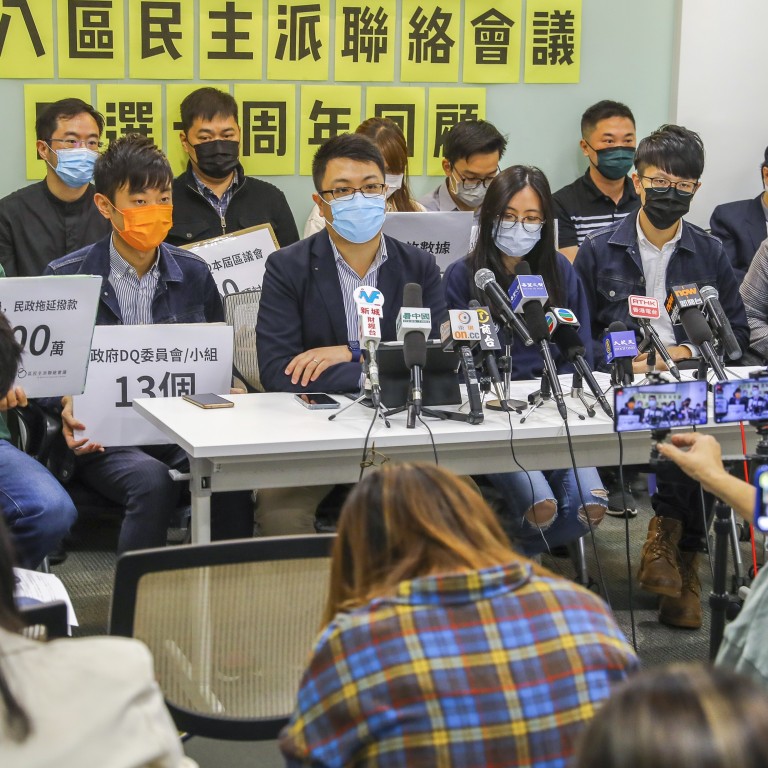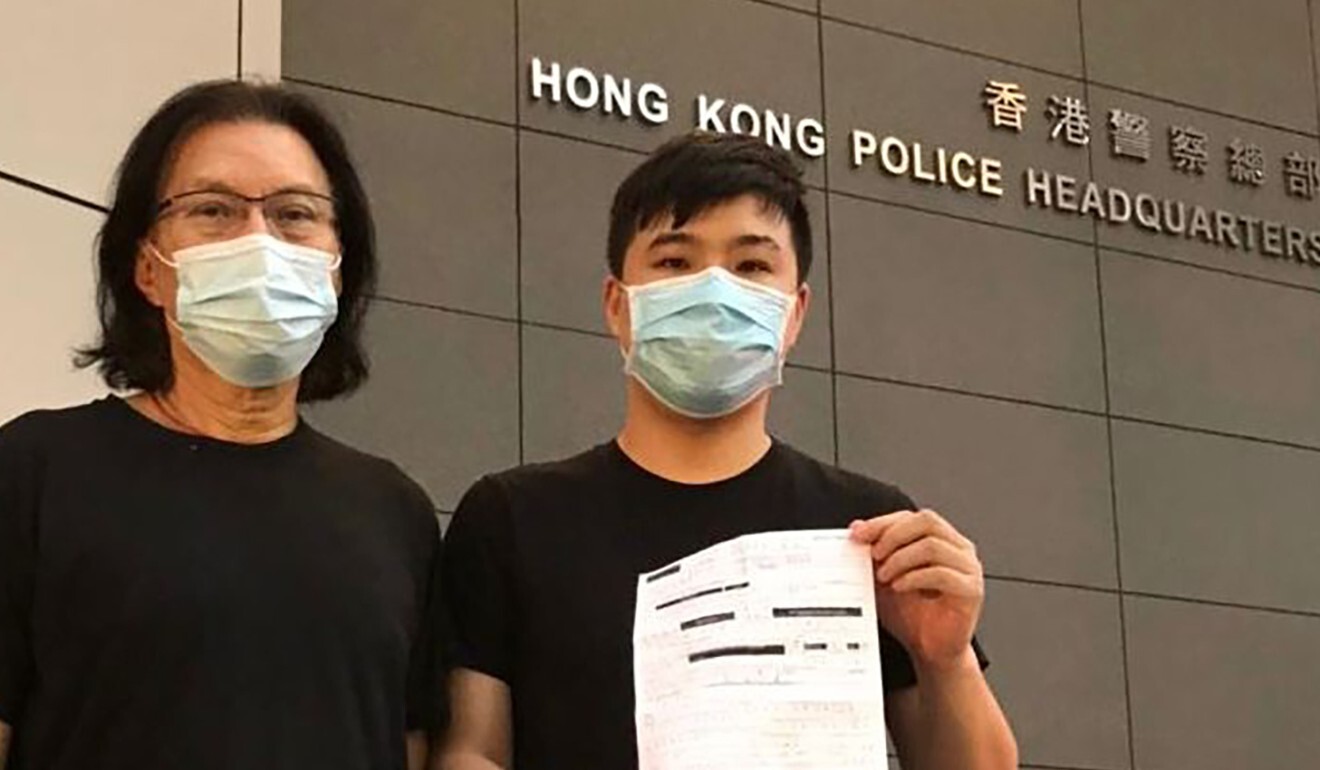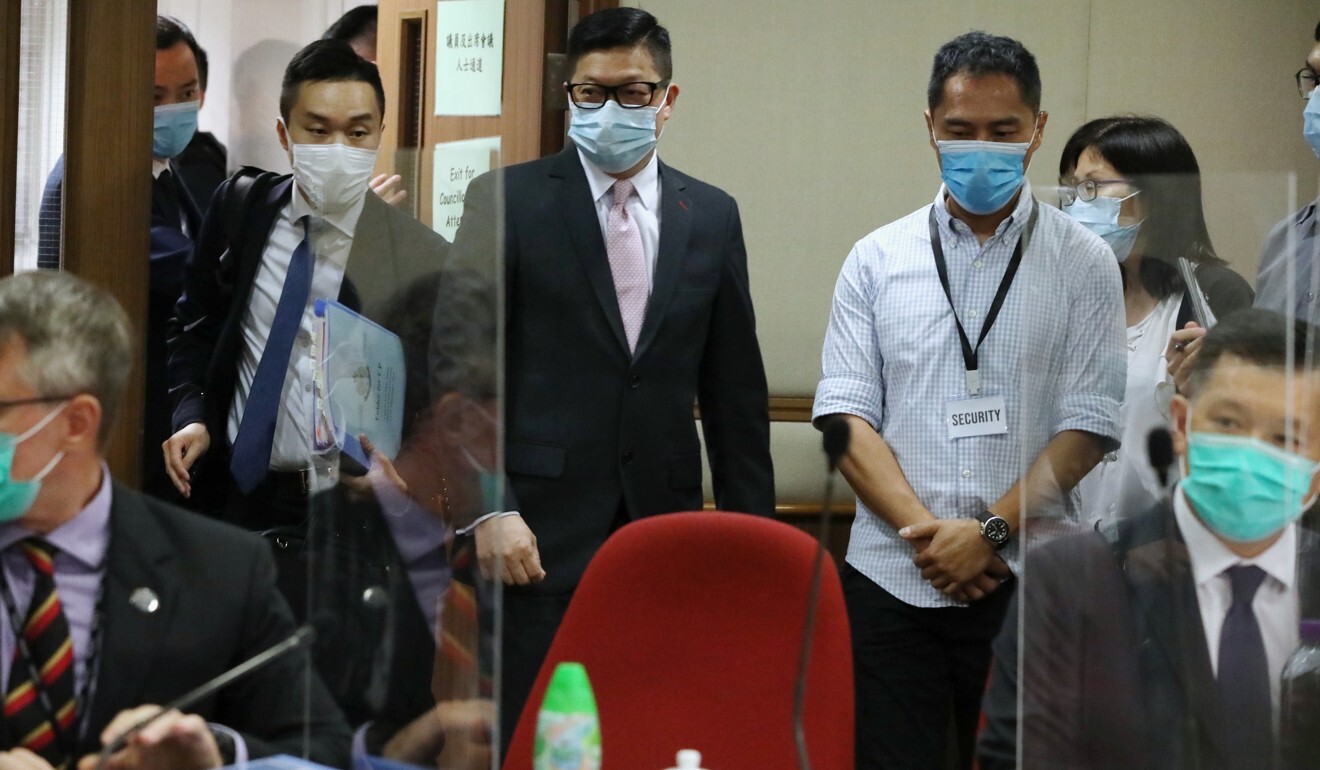
They swept last year’s district council polls. That victory glow has since faded – Hong Kong’s opposition and its municipal-level struggles
- Discord between district councillors and officials symbolic of city’s wider political strife, with meetings ending in walkouts or gridlock
- Opposition accuses government of stonewalling efforts, while rivals say the camp only has itself to blame for its confrontational stance
Fresh off winning 392 of 452 seats, the newly minted pan-democratic councillors had hoped they could push for results in both political and social spheres, but the afterglow of their triumph has since faded – discussions with officials have usually ended in walkouts and disputes.
Since January, there have been 89 instances of government representatives walking out of regular council meetings, according to a count by 18 District Councils Liaison, a group formed by opposition councillors.

This year, some 50 elected opposition councillors – 13 per cent of the bloc – have been arrested over offences such as police obstruction, illegal assembly or misconduct in public office, according to a count by the Post.
‘Changing’ rules of the game
The pro-establishment camp also said their opponents failed to understand the mission of district councils, which are advisory bodies in the communities, not political forums to debate citywide matters.
Political analysts said that as Beijing remained tough on Hong Kong’s opposition camp, there was little room for officials and the unruly district councillors of the bloc to reconcile differences.

05:45
Hong Kong’s pro-Beijing camp reeling after crushing defeat in district council elections
“The mainstream, traditional pan-democratic parties were also influenced by their colleagues and online media, and became more radicalised,” said Ivan Choy Chi-keung, a political scientist at Chinese University.
According to district council chairmen who talked to the Post, since the beginning of the term, political topics or sensitive issues were off-limits at discussions, with taboo subjects ranging from the anti-government protests and national security law, to the annual June Fourth vigil and the controversial Lantau Tomorrow reclamation project.
“District officers would say such an item falls outside the functions of a district council,” Sumly Chan Yuen-sum, chairman of Tsuen Wan District Council, said. “Most of the time they will walk out of the meeting.”
A district councillor of more than 30 years, Chan said the rules of the game had changed starkly since the new term began.
A new era: how will Hong Kong’s legislature function without an opposition?
“But this year, when we proposed discussing the violence used by the police force in anti-government movements, we were banned. That was not reasonable.”
Sha Tin councillor Raymond Li Chi-wang also said some opposition councillors were aghast when the government’s red line was often extended, from blocking discussions of protest-linked issues to other livelihood matters.
He recalled a meeting in which officials walked out when the Mandatory Provident Fund was brought up. The MPF is a compulsory pension scheme with a controversial offsetting mechanism allowing employers to dip into the accounts of workers to cover long-service and severance payments.
“They say we don’t have a role in it because it is not a district issue but one related to the whole of Hong Kong. But how are Sha Tin residents not affected?” Li said.
In most of these circumstances, opposition district councillors continued the discussions without secretariat support. Sometimes, they claimed, meetings unrecognised by officials were held in the corridors of government offices, with entry to dedicated conference rooms refused.
Hong Kong police chief hits back at councillors who disinvited him from meeting
In response to an inquiry from the Post, a spokesman for the Home Affairs Department said government officials would not participate in discussions and no secretarial services could be provided if the issues were considered inconsistent with the District Council Ordinance.
Hong Kong’s opposition camp scored a landslide victory in the district council elections after nearly six months of anti-government protests last year. Many winners of the polls were first-time candidates. The newcomers, including students, ordinary office workers and professionals in their 20s, managed to defeat seasoned pro-establishment councillors, including veterans who had served for decades.
The relationship between opposition councillors and the government turned irretrievably sour after police in March arrested the chairwoman of the Central and Western District Council, Cheng Lai-king, under the colonial-era offence of sedition over an online post criticising an officer who shot a journalist.
The camp believed her arrest was related to her confrontational attitude towards police when chairing council meetings. In one held in January and attended by Commissioner of Police Chris Tang Ping-keung, Cheng grilled him over alleged police brutality and evicted a plainclothes officer who refused to show his warrant card.

At the meeting, Tang had rejected calls for the force to apologise for its alleged brutality during the social unrest, saying it was “rioters” who needed to say sorry for the harm they caused the city.
For the pro-government camp, which has dominated the district councils since local elections were put in place in 1982, the past year has meant adapting to a new role as the minority – monitoring the performance of opposition colleagues with newly formed pressure groups.
Nicole Lau Pui-yuk, a Sham Shui Po councillor from the Democratic Alliance for the Betterment and Progress of Hong Kong (DAB), founded District Council Observers earlier in the year with other colleagues from major pro-establishment parties. She repeatedly slammed opposition councillors for blocking livelihood policies for political gain.
After Legco oustings, Hong Kong’s opposition district councillors fear they’re next
In Lau’s district, where she is one of only two pro-establishment members on the 25-member council, she said her proposal to discuss initiatives encouraging residents to take coronavirus tests was blocked from being raised in a meeting.
“This is something beneficial to all residents regardless of their political affiliations. But the opposition just seized every chance to smear the government,” she said.
Communication channels or battlefields?
At a press conference on Monday, representatives of the opposition’s 18 District Councils Liaison reported on the performance of their councillors in curbing the Covid-19 outbreak in communities. They said a total of HK$37 million in funding was allocated to 17 districts controlled by the opposition to purchase 10 million face masks and 340,000 units of hand sanitiser for residents.
But their efforts were often obstructed by the authorities, who deliberately withheld some of the Covid-19 funding applications, according to Choy Chak-hung, Kwun Tong District Council chairman.
US and Five Eyes allies express concern over ousting of Hong Kong lawmakers
Pro-establishment heavyweight Tam Yiu-chung, the sole Hong Kong delegate to the National People’s Congress Standing Committee, had warned that the red line used to unseat the four opposition lawmakers should also apply to district councillors.
“I guess we will continue to test the administration’s limits. We will not avoid them, and see how they respond to livelihood issues,” he said.
Mainland legal expert wants more education on national security in Hong Kong
Chung Kam-lun, the 18 District Councils Liaison convenor, who is also chairman of Sai Kung District Council, said his opposition colleagues had mentally prepared for a hard fight against what he called escalating suppression by the authorities.
“District councils remain the last battle front of Hong Kong’s pro-democracy force after legislators resigned en masse,” he added.
But Kwun Tong district councillor Frankie Ngan Man-yu, a DAB member, said the pan-democrats must understand that district councils were meant to be communication channels between residents and the government, not political battlefields.
“Councillors must not refuse to communicate with officials, yet opposition councillors had boycotted meetings with the financial secretary, the chief secretary and the home affairs secretary,” he said.
Additional reporting by Tony Cheung, Chris Lau and Cheryl Heng


